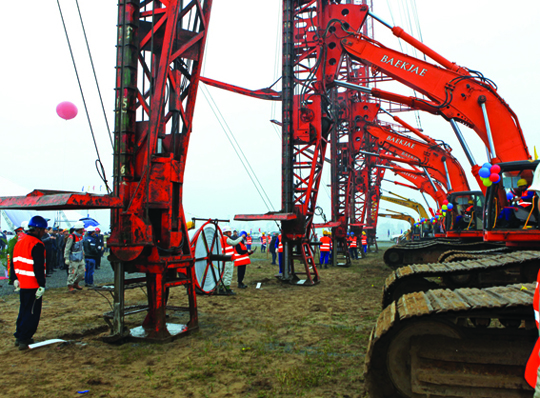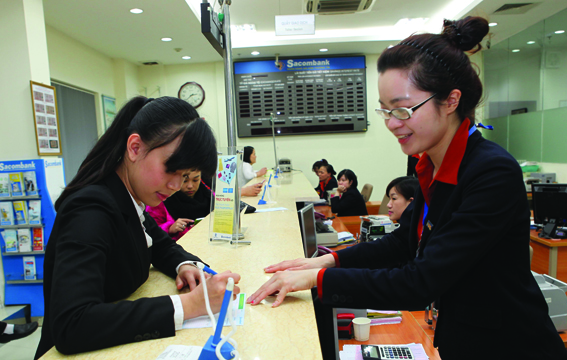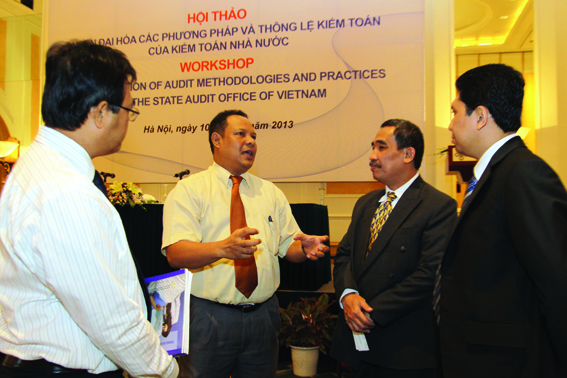The Government has recently set out major tasks and solutions to improve the business environment and national competitiveness.

Assembling automobiles in Truong Hai Motor workshop in Chu Lai industrial
complex (Quang Nam province)__Photo: Tran Le Lam/VNA
Under Resolution No. 19/NQ-CP of March 18, Vietnam will focus on effectively implementing three strategic breakthroughs, including improving institutions, developing infrastructure and raising the quality of education and human resources, along with restructuring the economy and changing the growth model.
During 2014-15, the nation will focus on improving the business environment, strongly reforming administrative procedures, reducing administrative processes and costs, while ensuring publicity and transparency and increasing the accountability of state administrative agencies. It aims to reach, by the end of 2015, the averages of the ASEAN-6 group regarding some key performance indicators.
Strongly reforming tax, customs and business procedures
The resolution sets the target of streamlining processes and simplifying paperwork in order to shorten the time for tax payment and import and export clearance to the averages of the ASEAN-6 group.
According to international statistics, in 2013, the average time to pay tax in ASEAN-6 countries was 171 hours per year, where it took 259 hours in Indonesia, 264 hours in Thailand, 193 hours in the Philippines, 133 hours in Malaysia, 96 hours in Brunei, 82 hours in Singapore and 876 hours in Vietnam.
As in the customs sector, in 2013, a Vietnam-based business had to spend 21 days to complete either import or export formalities. Meanwhile, the average of the ASEAN-6 group was just 13 days for import and 14 days for export, with Indonesia - 23 and 17 days, Brunei - 15 and 19 days, the Philippines - 14 and 15 days, Thailand - 13 and 14 days, Malaysia - 8 and 11 days, and Singapore - 4 and 5 days.
Commenting on the ambitious target set for the tax sector, Nguyen Thi Cuc, Chairman of Vietnam Tax Consultants’ Association, said this was a difficult challenge but not an impossible mission. “To reach this goal, the tax sector should review and revise regulations on tax payment dossiers and procedures and further publicize tax-related administrative procedures so as to offer easier access for businesses and citizens,” she suggested.
“However, this is not enough,” she added, saying that Vietnam has approximately 1.7 million business households, more than one million personal income tax payers and 400,000 small-sized businesses. However, these subjects and even accounting staffs of big businesses can hardly grasp fully, and be timely updated with changes in, the current system of legal documents on taxes, charges and fees, which comprises 10 laws and ordinances and hundreds of guiding documents. As a result, it takes them a long time to carry out tax procedures. This is one crucial cause for the prolongation of the time to complete the tax payment process in Vietnam to five times the average of the ASEAN-6 group.
“To tackle this problem, Vietnam should develop the network of tax agents who will provide plenty of tax-related services to taxpayers, ranging from submitting documents and dossiers to proving the accuracy of tax declaration and payment to requesting tax reduction, exemption or refund,” Cuc suggested.
With regard to the customs sector, the resolution requests the Ministry of Finance to continue accelerating administrative reform in a comprehensive manner, effectively applying the one-stop-shop mechanism and promoting coordination among related agencies so as to create a breakthrough right in 2014. Information on tax- and customs-related administrative procedures should be widely publicized so as to facilitate public access and supervision, meanwhile dialogues between tax and customs agencies and businesses should be increased in order to promptly find out solutions to any arising hurdles.
The resolution also sets the target of reducing the time required to start new businesses to no more than six days and the time to settle bankruptcy cases to 30 months at most.
In light of this, the Government asks the Ministry of Planning and Investment to further study amending the Investment Law, the Enterprise Law and the Bankruptcy Law, focusing on simplifying procedures for investment licensing, business registration and bankruptcy settlement. In addition, the Enterprise Law should be amended toward protecting property rights, investors and minority shareholders in line with international standards.
The Government also urges the Ministry of Industry and Trade to take measures to reduce time for businesses and investment projects to get access to electricity to no more than 70 days which, however, remains a long process compared to the average of 50.3 days of the ASEAN-6 group.
Raising the national competitiveness
Together with administrative reform, the Government is determined to facilitate and ensure equality, openness and transparency in market-based access to credit among entities of all economic sectors as well as making public and more transparent information about business performance and financial status in accordance with law and in line with international practices.
Attaching importance to information technology application in various sectors and industries, the Government regards information technology as a new approach to develop and renew management, production and service provision processes so as to raise the national competitiveness. In light of this, it will improve or adopt preferential mechanisms and policies to stimulate the application of information technology in all investment projects and production and business activities of enterprises.
Higher incentives will also be offered to mobilize resources from the non-state sector for investment in building a synchronous infrastructure system, prioritizing the development of infrastructure for transport and in major urban centers.
Obviously, Vietnam is now facing a great challenge to raise its competitiveness, especially in the context where the ASEAN Economic Community will be officially established in 2015.
Over the past, Vietnam has always paid attention to improving the business environment and raising national competitiveness. However, results remain far below expectations. According to the World Economic Forum’s Global Competitiveness Report for 2013-14, Vietnam is ranked 70th among 148 states but in terms of economic institutions, the country’s position drops to 98th. Meanwhile, the World Bank’s Doing Business Index places Vietnam at the 99th ranking in 2013. According to the results of the 2013 Provincial Competitiveness Index Survey conducted by the Vietnam Chamber of Commerce and Industry, 54 percent of foreign-invested enterprises have considered other investment destinations before deciding to pour their money into Vietnam, a significant increase from 32 percent in 2011.
In this situation, the promulgation of the resolution expresses the Vietnamese Government’s determination “to take more specific actions to improve the business environment and create more favorable conditions for the development of enterprises of all economic sectors,” as Deputy Prime Minister Vu Duc Dam said at the Vietnam 2014 Business Forum on Sustainable Development held early this year.-


